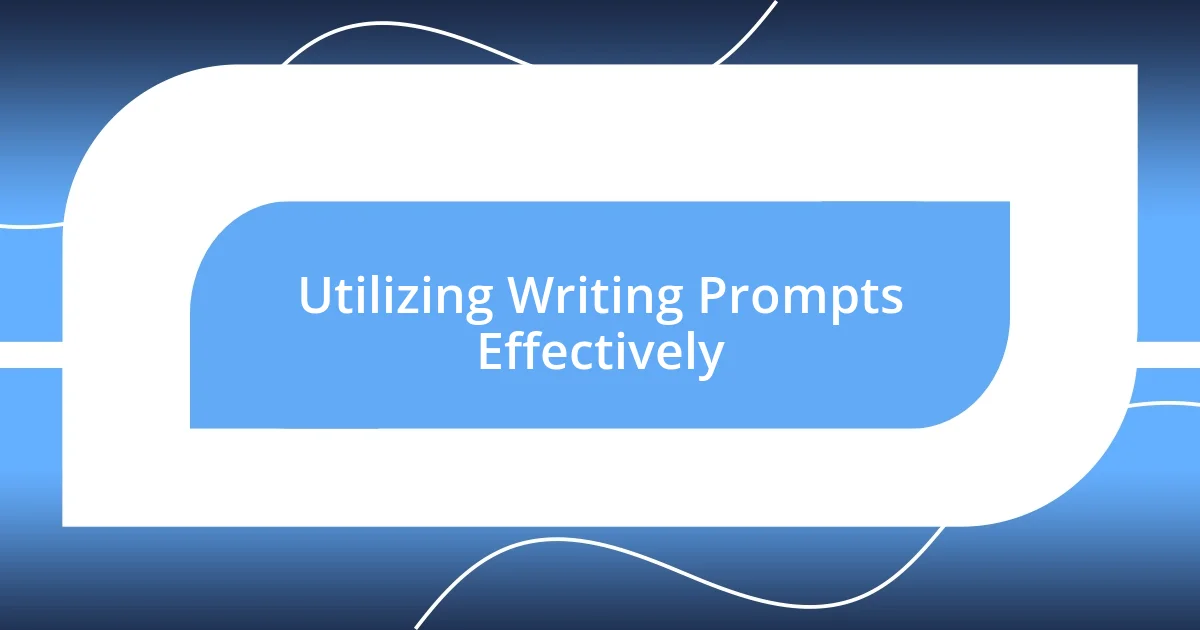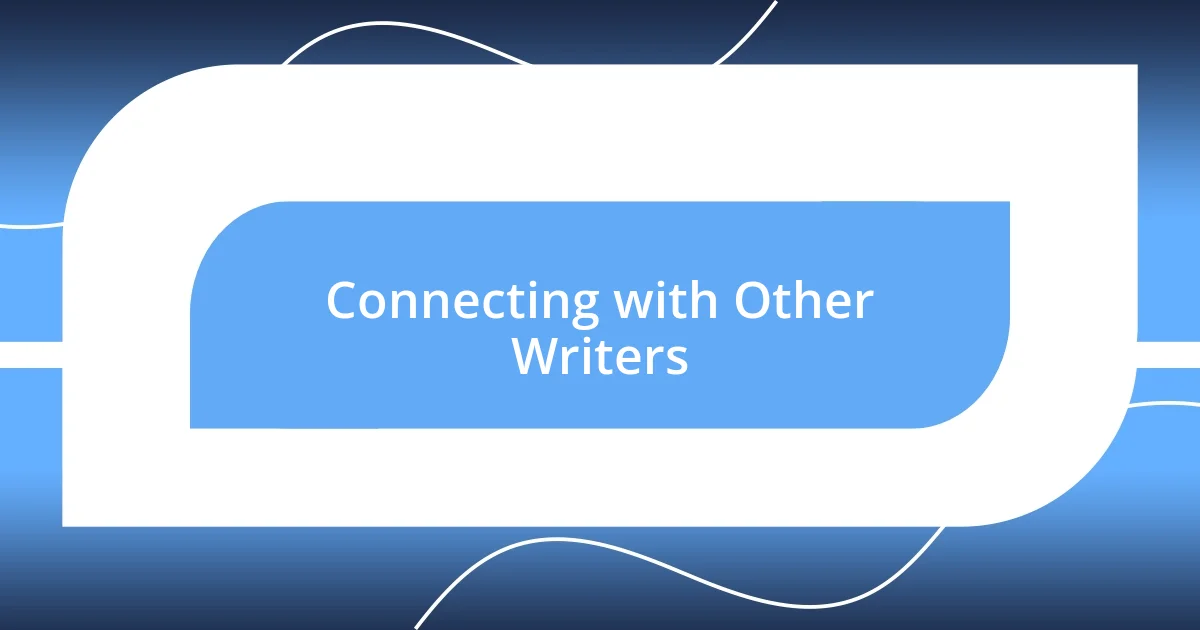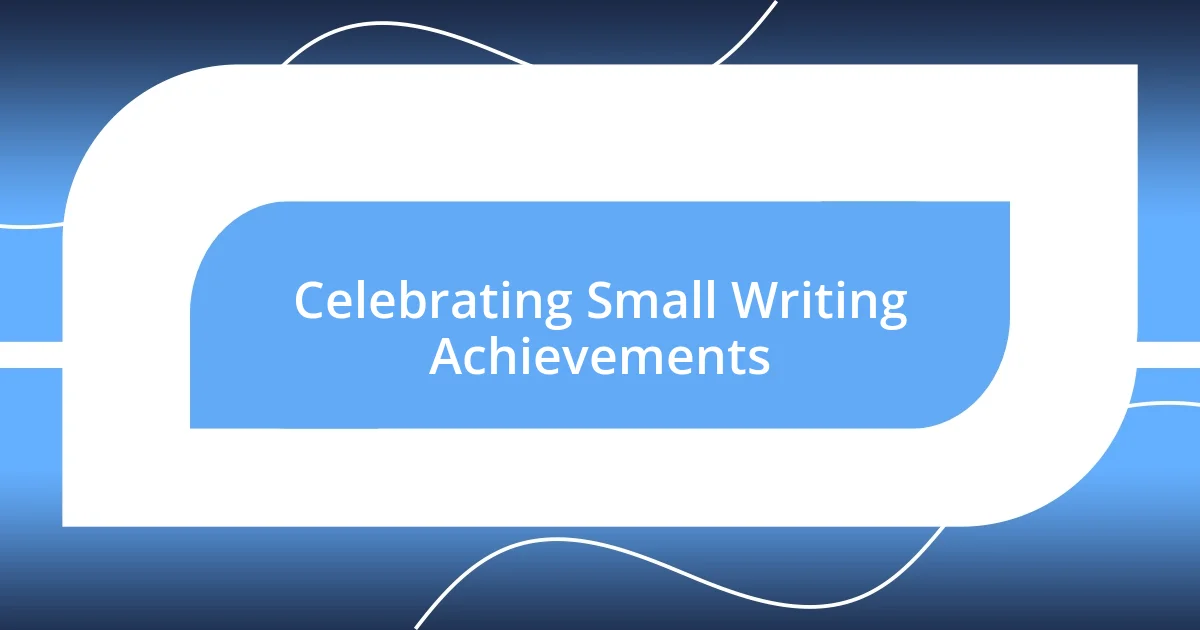Key takeaways:
- Finding your writing passion involves self-discovery, exploring different genres, and connecting deeply with personal experiences to enhance creativity.
- Establishing a consistent writing routine, identifying peak productivity hours, and creating a dedicated space can significantly improve writing productivity.
- Connecting with other writers for feedback, celebrating small achievements, and incorporating constructive criticism can foster growth and sustain motivation in the writing journey.

Finding Your Writing Passion
Finding your writing passion is truly a journey of self-discovery. I remember when I stumbled upon my love for storytelling; it was during a mundane afternoon when I decided to write a silly poem about my cat. The sheer joy I felt as I played with words opened my eyes to how liberating writing could be. Have you ever had a moment where writing just flowed effortlessly? That’s a vital sign that you’re on the right track.
Exploring different genres and styles can be a thrilling part of uncovering what ignites your creativity. I’ve tried everything from travel writing to blogging about my favorite hobbies, and each experiment taught me something new about myself. How often do we shy away from exploring new possibilities out of fear? I’ve learned that stepping out of my comfort zone not only enhances my skills but also deepens my love for the craft.
It’s also important to reflect on what truly moves you. For me, writing about personal experiences has always felt like a deep connection to my readers. When I share my struggles with imposter syndrome, I not only heal myself but also resonate with others facing similar challenges. Have you found those topics that feel close to your heart? It’s in those moments of vulnerability that our passion and authenticity shine through.

Establishing a Routine That Works
When it comes to establishing a writing routine, I’ve found that consistency is key. I remember setting aside time every morning, fueled by my favorite cup of coffee, and how that simple ritual transformed my writing sessions into something I eagerly anticipated. Finding that sweet spot in the day when my mind feels most alive can make all the difference, allowing creativity to thrive without the clutter of distractions.
To create a routine that works for you, consider these tips:
- Identify your peak productivity hours: Experiment with writing at different times of day to find when your creativity flows best.
- Set specific goals: Whether it’s a word count or a timeframe, having a target keeps you focused and motivated.
- Create a dedicated writing space: A space set aside just for writing can help signal your brain that it’s time to create.
- Incorporate breaks: Don’t underestimate the power of stepping away; short breaks can rejuvenate your mind and keep you engaged.
- Be adaptable: Life happens, and being flexible allows you to tweak your routine as needed without guilt.
Building a routine that resonates with you doesn’t have to be overly rigid or daunting. It can be as simple as pairing your writing with soothing music or a cozy blanket to make it feel like a comforting retreat.

Exploring New Writing Genres
Exploring new writing genres is an adventure I genuinely cherish. I recall my first attempt at writing a short story in the fantasy genre. It felt exhilarating to create entire worlds and characters that were free from the constraints of reality. Have you ever let your imagination run wild on the page? It’s in those moments that I feel truly alive as a writer.
Diving into unfamiliar genres can also surprise you with how much you learn. For instance, when I experimented with poetry, I discovered a rhythm in language that I hadn’t noticed before. It challenged me to find beauty in brevity, and such learning experiences enrich my writing toolkit. Isn’t it intriguing how each genre offers a different lens through which we can view our thoughts and feelings?
The process of experimenting with new styles can lead to some fascinating results. I once blended science fiction with memoir, reflecting on personal experiences while speculating about future technologies. This hybrid approach not only breathed new life into my writing but also drew unexpected interest from readers. What genres have you thought about trying? I encourage you to explore and you might find hidden treasures within your own voice.
| Genre | Purpose |
|---|---|
| Fantasy | Allows for creative world-building and imaginative storytelling. |
| Poetry | Emphasizes emotional expression and concise language. |
| Science Fiction | Explores futuristic concepts while reflecting on human experiences. |

Utilizing Writing Prompts Effectively
Utilizing writing prompts can feel like having a treasure map in the writing world. I remember a time when I stumbled upon a prompt that challenged me to write from the perspective of an inanimate object. I chose a coffee mug, and to my surprise, I created an entire narrative filled with personality and warmth. It was enlightening! Have you ever considered how something so mundane could have a story to tell?
Writing prompts serve as sparks that ignite creative thinking. I like to keep a list of prompts close at hand, so whenever I feel a creativity lull, I can pick one and dive in. Recently, I used a prompt about “the last person on Earth.” This led me to explore themes of loneliness and hope in ways I hadn’t thought possible. Isn’t it fascinating how a single sentence can open up a floodgate of ideas and emotions?
To make the most of prompts, I encourage you to adapt them to fit your style and interests. If a prompt doesn’t resonate with me right away, I tweak it until it does. For instance, instead of writing about a lost treasure, I wrote about an old family recipe that held the key to my character’s identity. This personalization not only made the writing more authentic but also deepened my connection to the piece. How have you transformed prompts in your writing?

Connecting with Other Writers
Connecting with other writers can be a game changer in any writing journey. I vividly remember the first time I attended a local writing workshop. The energy in the room was palpable, and it sparked new ideas I hadn’t even considered. Isn’t it remarkable how sharing experiences can ignite creativity? Each story told by fellow writers opened my eyes to different perspectives, and that shared passion is always inspiring.
I often engage with writers online too. Joining writing communities on social media has provided me with invaluable feedback on my work. Just the other day, I posted a snippet of a poem I was struggling with, and the responses were overwhelming! Fellow writers offered constructive criticism and encouragement, reminding me that I’m not alone in this creative process. How often do we forget that a fresh set of eyes can shed light on our blind spots?
Moreover, I cherish the friendships I’ve fostered through these connections. Collaborating on projects has led to exciting exchanges and the chance to brainstorm ideas together. For instance, I once co-wrote a short story with a friend I met online; the process was a mixture of laughter, creativity, and mutual support. Have you ever thought about how powerful collaboration can be when you’re all pushing each other to improve? It’s this sense of community that makes writing not just a solitary journey, but a shared adventure.

Incorporating Feedback into Your Process
Incorporating feedback into your writing process can feel daunting, yet it holds incredible potential for growth. I remember a time when I nervously shared an early draft with a trusted friend. Her insights revealed elements I hadn’t considered, and that simple act of vulnerability opened new avenues for my story. Have you ever been surprised by how much you can learn from someone else’s perspective?
I make it a habit to seek feedback at various stages of my writing, not just at the end. For instance, while working on a novel, I shared the first few chapters with a small group of fellow writers. Their responses helped me refine my characters’ motivations before I went too far down the wrong path. It’s a bit like sculpting; sometimes you need to chip away at the rough edges before unveiling the masterpiece beneath. How often do you welcome input while you’re still in the creative flow?
Additionally, I’ve learned to differentiate between types of feedback. Constructive criticism serves to enhance my work while positive reinforcement keeps my spirits high. After receiving mixed feedback on a short story, I chose to focus on the parts that resonated with readers. This balance reminds me that not all input must be taken to heart; sometimes, it’s about finding the rhythm that works best for your style. Isn’t it enlightening to realize that feedback can guide your evolution as a writer while still allowing you to maintain your unique voice?

Celebrating Small Writing Achievements
Celebrating small writing achievements is a delightful way to stay motivated and engaged in the craft. I remember the first time I completed a paragraph that truly captured the emotion I aimed for. I felt like I had just crossed a personal finish line! It’s fascinating how acknowledging even the tiniest victories can fuel your desire to keep writing. How often do we overlook our progress in the pursuit of a larger goal?
One of my favorite ways to celebrate these milestones is by treating myself to something small and enjoyable. After finishing a challenging chapter, I might indulge in a slice of my favorite cake or take time to watch a movie I’ve been eager to see. Isn’t it lovely how simple rewards can recharge your creative batteries? These moments remind me that every bit of progress is worth honoring, reinforcing my commitment to writing.
Moreover, sharing these achievements with friends or fellow writers adds an extra layer of joy. I had a mentor who always encouraged me to share my wins, no matter how small. One day, after finishing a tough draft, I posted about it in our writing group. The outpouring of support lifted my spirits and reminded me how interconnected our journeys are. Have you considered how celebrating your victories might inspire others too?












